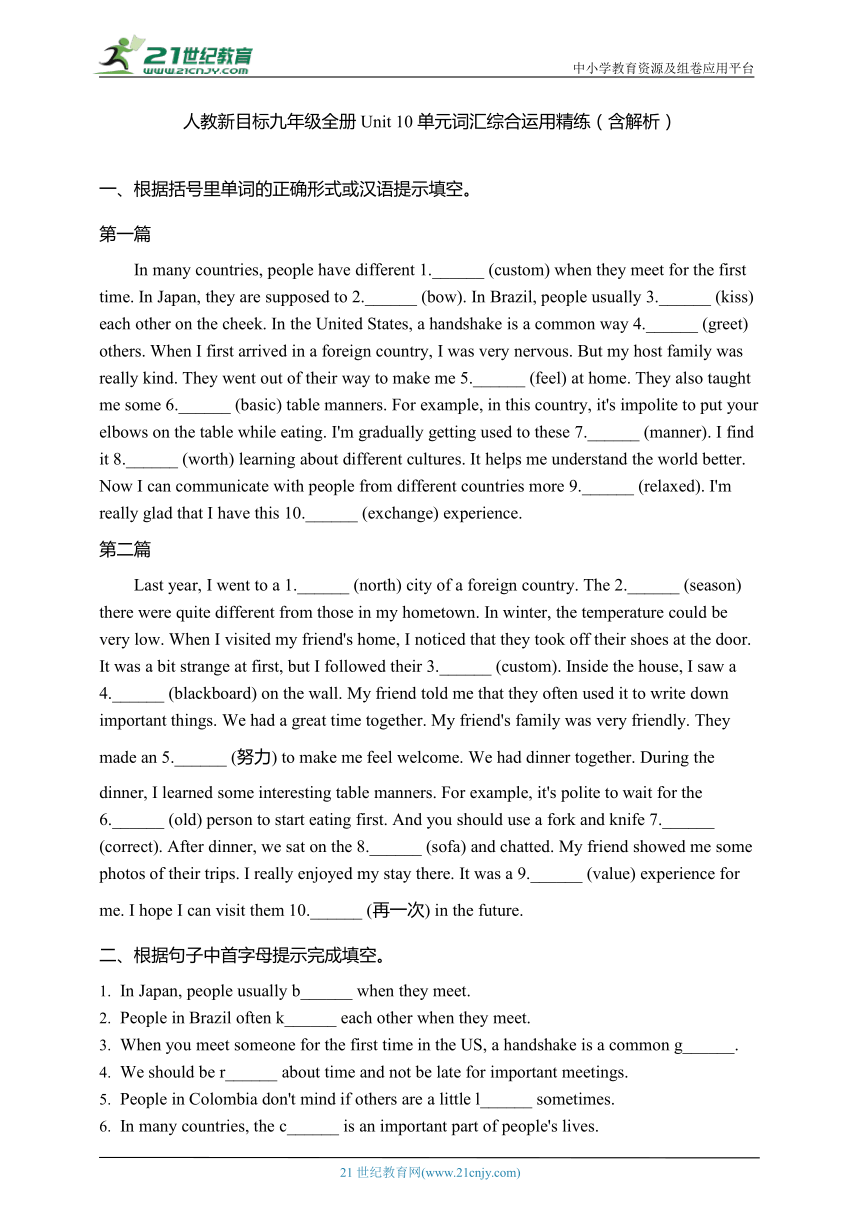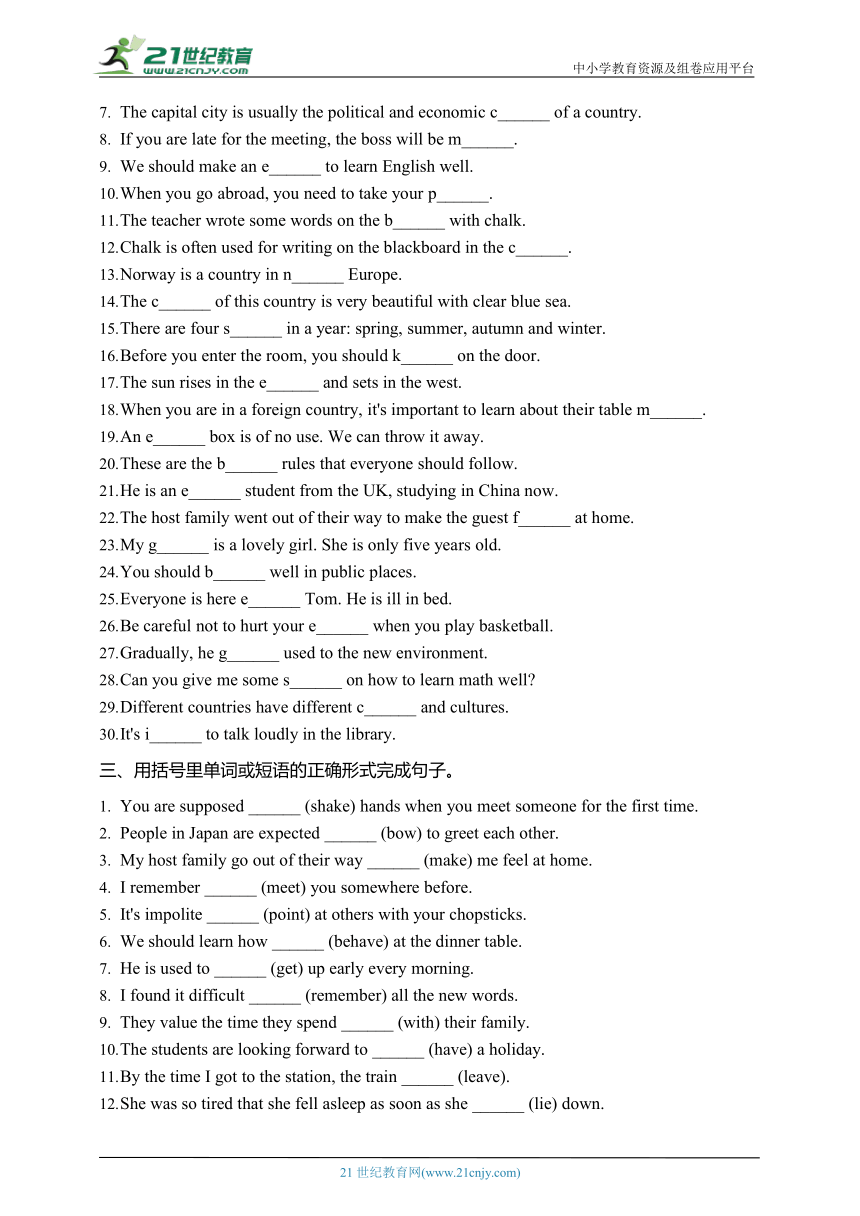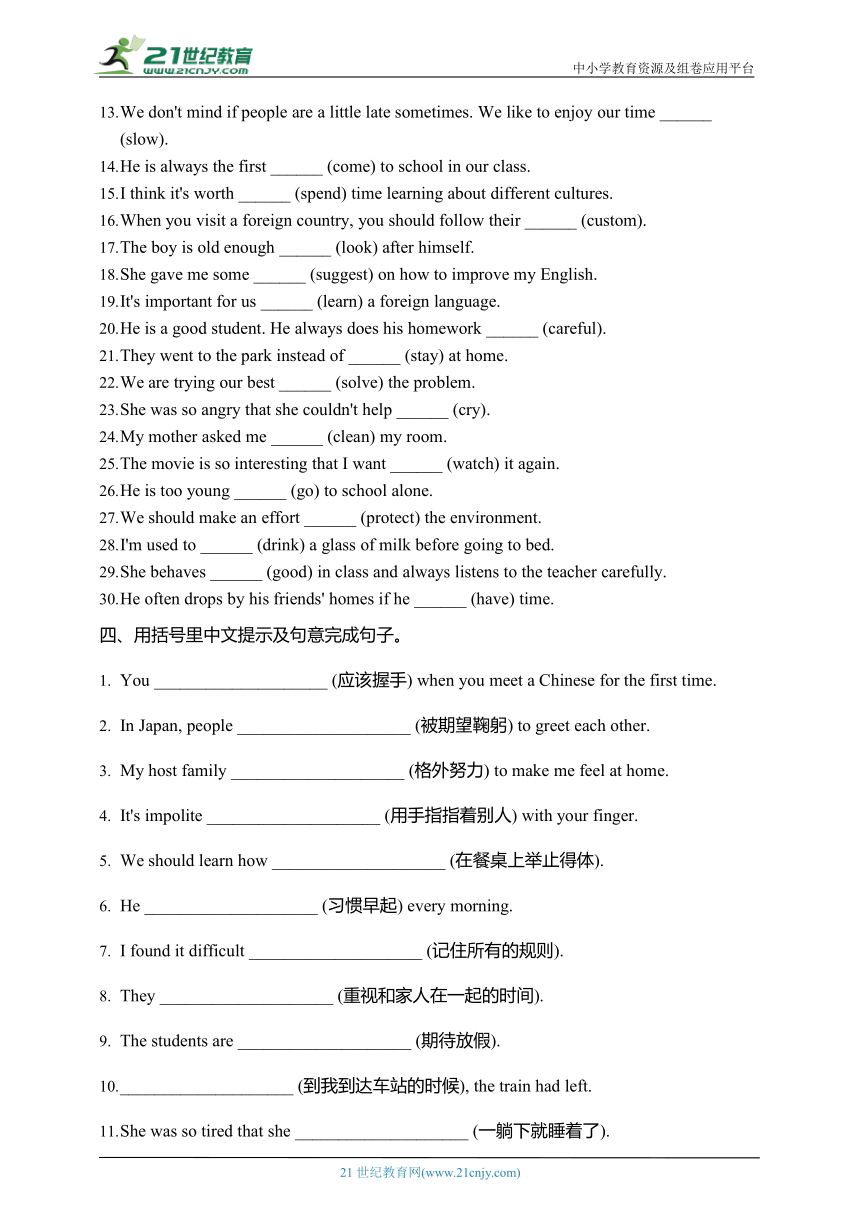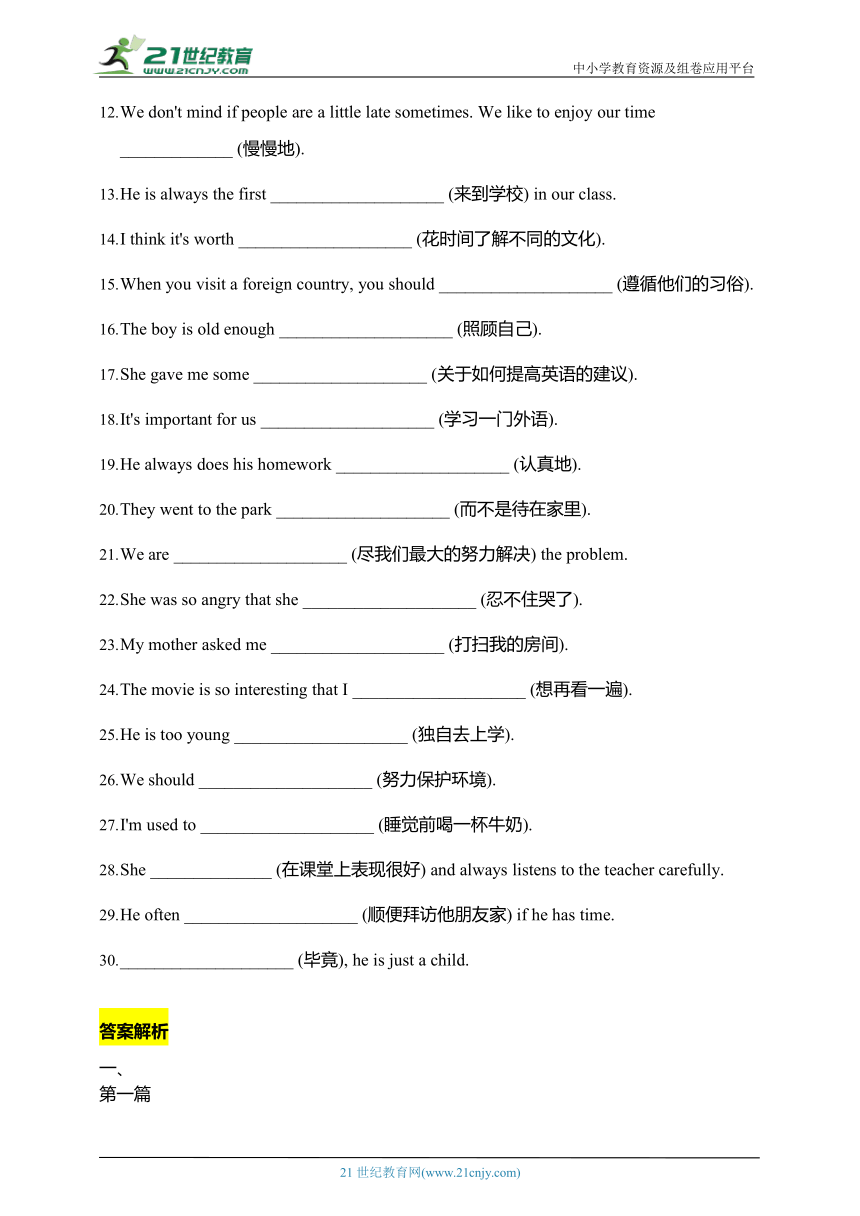Unit 10单元词汇考点精练(含答案解析)—人教新目标九年级全册Unit 10 You're supposed to shake hands.
文档属性
| 名称 | Unit 10单元词汇考点精练(含答案解析)—人教新目标九年级全册Unit 10 You're supposed to shake hands. |

|
|
| 格式 | docx | ||
| 文件大小 | 55.6KB | ||
| 资源类型 | 试卷 | ||
| 版本资源 | 人教新目标(Go for it)版 | ||
| 科目 | 英语 | ||
| 更新时间 | 2025-08-15 00:00:00 | ||
图片预览




文档简介
中小学教育资源及组卷应用平台
人教新目标九年级全册Unit 10单元词汇综合运用精练(含解析)
一、根据括号里单词的正确形式或汉语提示填空。
第一篇
In many countries, people have different 1.______ (custom) when they meet for the first time. In Japan, they are supposed to 2.______ (bow). In Brazil, people usually 3.______ (kiss) each other on the cheek. In the United States, a handshake is a common way 4.______ (greet) others. When I first arrived in a foreign country, I was very nervous. But my host family was really kind. They went out of their way to make me 5.______ (feel) at home. They also taught me some 6.______ (basic) table manners. For example, in this country, it's impolite to put your elbows on the table while eating. I'm gradually getting used to these 7.______ (manner). I find it 8.______ (worth) learning about different cultures. It helps me understand the world better. Now I can communicate with people from different countries more 9.______ (relaxed). I'm really glad that I have this 10.______ (exchange) experience.
第二篇
Last year, I went to a 1.______ (north) city of a foreign country. The 2.______ (season) there were quite different from those in my hometown. In winter, the temperature could be very low. When I visited my friend's home, I noticed that they took off their shoes at the door. It was a bit strange at first, but I followed their 3.______ (custom). Inside the house, I saw a 4.______ (blackboard) on the wall. My friend told me that they often used it to write down important things. We had a great time together. My friend's family was very friendly. They made an 5.______ (努力) to make me feel welcome. We had dinner together. During the dinner, I learned some interesting table manners. For example, it's polite to wait for the 6.______ (old) person to start eating first. And you should use a fork and knife 7.______ (correct). After dinner, we sat on the 8.______ (sofa) and chatted. My friend showed me some photos of their trips. I really enjoyed my stay there. It was a 9.______ (value) experience for me. I hope I can visit them 10.______ (再一次) in the future.
二、根据句子中首字母提示完成填空。
In Japan, people usually b______ when they meet.
People in Brazil often k______ each other when they meet.
When you meet someone for the first time in the US, a handshake is a common g______.
We should be r______ about time and not be late for important meetings.
People in Colombia don't mind if others are a little l______ sometimes.
In many countries, the c______ is an important part of people's lives.
The capital city is usually the political and economic c______ of a country.
If you are late for the meeting, the boss will be m______.
We should make an e______ to learn English well.
When you go abroad, you need to take your p______.
The teacher wrote some words on the b______ with chalk.
Chalk is often used for writing on the blackboard in the c______.
Norway is a country in n______ Europe.
The c______ of this country is very beautiful with clear blue sea.
There are four s______ in a year: spring, summer, autumn and winter.
Before you enter the room, you should k______ on the door.
The sun rises in the e______ and sets in the west.
When you are in a foreign country, it's important to learn about their table m______.
An e______ box is of no use. We can throw it away.
These are the b______ rules that everyone should follow.
He is an e______ student from the UK, studying in China now.
The host family went out of their way to make the guest f______ at home.
My g______ is a lovely girl. She is only five years old.
You should b______ well in public places.
Everyone is here e______ Tom. He is ill in bed.
Be careful not to hurt your e______ when you play basketball.
Gradually, he g______ used to the new environment.
Can you give me some s______ on how to learn math well
Different countries have different c______ and cultures.
It's i______ to talk loudly in the library.
三、用括号里单词或短语的正确形式完成句子。
You are supposed ______ (shake) hands when you meet someone for the first time.
People in Japan are expected ______ (bow) to greet each other.
My host family go out of their way ______ (make) me feel at home.
I remember ______ (meet) you somewhere before.
It's impolite ______ (point) at others with your chopsticks.
We should learn how ______ (behave) at the dinner table.
He is used to ______ (get) up early every morning.
I found it difficult ______ (remember) all the new words.
They value the time they spend ______ (with) their family.
The students are looking forward to ______ (have) a holiday.
By the time I got to the station, the train ______ (leave).
She was so tired that she fell asleep as soon as she ______ (lie) down.
We don't mind if people are a little late sometimes. We like to enjoy our time ______ (slow).
He is always the first ______ (come) to school in our class.
I think it's worth ______ (spend) time learning about different cultures.
When you visit a foreign country, you should follow their ______ (custom).
The boy is old enough ______ (look) after himself.
She gave me some ______ (suggest) on how to improve my English.
It's important for us ______ (learn) a foreign language.
He is a good student. He always does his homework ______ (careful).
They went to the park instead of ______ (stay) at home.
We are trying our best ______ (solve) the problem.
She was so angry that she couldn't help ______ (cry).
My mother asked me ______ (clean) my room.
The movie is so interesting that I want ______ (watch) it again.
He is too young ______ (go) to school alone.
We should make an effort ______ (protect) the environment.
I'm used to ______ (drink) a glass of milk before going to bed.
She behaves ______ (good) in class and always listens to the teacher carefully.
He often drops by his friends' homes if he ______ (have) time.
四、用括号里中文提示及句意完成句子。
You ____________________ (应该握手) when you meet a Chinese for the first time.
In Japan, people ____________________ (被期望鞠躬) to greet each other.
My host family ____________________ (格外努力) to make me feel at home.
It's impolite ____________________ (用手指指着别人) with your finger.
We should learn how ____________________ (在餐桌上举止得体).
He ____________________ (习惯早起) every morning.
I found it difficult ____________________ (记住所有的规则).
They ____________________ (重视和家人在一起的时间).
The students are ____________________ (期待放假).
____________________ (到我到达车站的时候), the train had left.
She was so tired that she ____________________ (一躺下就睡着了).
We don't mind if people are a little late sometimes. We like to enjoy our time _____________ (慢慢地).
He is always the first ____________________ (来到学校) in our class.
I think it's worth ____________________ (花时间了解不同的文化).
When you visit a foreign country, you should ____________________ (遵循他们的习俗).
The boy is old enough ____________________ (照顾自己).
She gave me some ____________________ (关于如何提高英语的建议).
It's important for us ____________________ (学习一门外语).
He always does his homework ____________________ (认真地).
They went to the park ____________________ (而不是待在家里).
We are ____________________ (尽我们最大的努力解决) the problem.
She was so angry that she ____________________ (忍不住哭了).
My mother asked me ____________________ (打扫我的房间).
The movie is so interesting that I ____________________ (想再看一遍).
He is too young ____________________ (独自去上学).
We should ____________________ (努力保护环境).
I'm used to ____________________ (睡觉前喝一杯牛奶).
She ______________ (在课堂上表现很好) and always listens to the teacher carefully.
He often ____________________ (顺便拜访他朋友家) if he has time.
____________________ (毕竟), he is just a child.
答案解析
第一篇
customs:空前有“different”修饰,需用可数名词复数形式,“custom”的复数为“customs”(习俗)。
bow:“be supposed to do sth”为固定搭配,意为“应该做某事”,故用动词原形“bow”(鞠躬)。
kiss:句子描述一般情况,主语“people”为复数,谓语动词用原形“kiss”(亲吻)。
to greet:“a way to do sth”为固定结构,意为“做某事的方式”,故用不定式“to greet”(问候)。
feel:“make sb do sth”为固定搭配,意为“使某人做某事”,故用动词原形“feel”(感觉)。
basic:修饰名词“table manners”需用形容词,“basic”(基本的)符合语境。
manners:“these”后接可数名词复数,“manner”表示“礼仪”时常用复数“manners”。
worth:“find it worth doing sth”为固定搭配,意为“发现做某事值得”,“worth”(值得的)为形容词。
relaxedly:修饰动词“communicate”需用副词,“relaxed”的副词形式为“relaxedly”(轻松地)。
exchange:此处为形容词修饰“experience”,“exchange”(交换的)符合“交换生经历”的语境。
第二篇
northern:修饰名词“city”需用形容词,“north”的形容词形式为“northern”(北方的)。
seasons:空前有“were”,主语需用复数,“season”的复数为“seasons”(季节)。
custom:此处指“脱鞋”这一具体习俗,用单数“custom”(习俗)。
blackboard:空前有“a”,用可数名词单数“blackboard”(黑板)。
effort:“make an effort”为固定短语,意为“努力”,故填“effort”。
oldest:定冠词“the”后接形容词最高级,“old”的最高级为“oldest”(最年长的)。
correctly:修饰动词“use”需用副词,“correct”的副词形式为“correctly”(正确地)。
sofa:空前有“the”,此处指一个沙发,用单数“sofa”(沙发)。
valuable:修饰名词“experience”需用形容词,“value”的形容词形式为“valuable”(有价值的)。
again:根据汉语提示,“再一次”对应“again”。
二、根据句子中首字母提示完成填空。
bow:句意“在日本,人们见面时通常鞠躬”,结合首字母“b”,填“bow”。
kiss:句意“巴西人见面时经常互相亲吻”,结合首字母“k”,填“kiss”。
greeting:句意“在美国初次见面时,握手是常见的问候方式”,结合首字母“g”,填“greeting”(问候)。
relaxed:句意“我们应该对时间保持放松,重要会议不要迟到”,结合首字母“r”,填“relaxed”(放松的)。
late:句意“哥伦比亚人不介意别人有时迟到一点”,结合首字母“l”,填“late”(迟到的)。
custom:句意“在许多国家,习俗是人们生活的重要部分”,结合首字母“c”,填“custom”(习俗)。
center:句意“首都通常是一个国家的政治和经济中心”,结合首字母“c”,填“center”(中心)。
mad:句意“如果你开会迟到,老板会生气”,结合首字母“m”,填“mad”(生气的)。
effort:句意“我们应该努力学好英语”,“make an effort”为固定短语,结合首字母“e”,填“effort”。
passport:句意“出国时,你需要带护照”,结合首字母“p”,填“passport”(护照)。
blackboard:句意“老师用粉笔在黑板上写了一些字”,结合首字母“b”,填“blackboard”。
classroom:句意“粉笔常在教室里用于在黑板上写字”,结合首字母“c”,填“classroom”(教室)。
northern:句意“挪威是北欧的一个国家”,结合首字母“n”,填“northern”(北方的)。
coast:句意“这个国家的海岸很美,有清澈的蓝色大海”,结合首字母“c”,填“coast”(海岸)。
seasons:句意“一年有四个季节:春、夏、秋、冬”,结合首字母“s”,填“seasons”(季节)。
knock:句意“进房间前,你应该敲门”,“knock on the door”为固定短语,结合首字母“k”,填“knock”。
east:句意“太阳从东方升起,从西方落下”,结合首字母“e”,填“east”(东方)。
manners:句意“在外国时,了解他们的餐桌礼仪很重要”,“table manners”为固定短语,结合首字母“m”,填“manners”。
empty:句意“空盒子没用,我们可以扔掉”,结合首字母“e”,填“empty”(空的)。
basic:句意“这些是每个人都应该遵守的基本规则”,结合首字母“b”,填“basic”(基本的)。
exchange:句意“他是一名来自英国的交换生,现在在中国学习”,结合首字母“e”,填“exchange”(交换的)。
feel:句意“寄宿家庭特意让客人感觉像在家一样”,“feel at home”为固定短语,结合首字母“f”,填“feel”。
granddaughter:句意“我的孙女是个可爱的女孩,她才五岁”,结合首字母“g”,填“granddaughter”(孙女)。
behave:句意“在公共场所你应该举止得体”,结合首字母“b”,填“behave”(举止)。
except:句意“除了汤姆,大家都来了,他生病卧床了”,结合首字母“e”,填“except”(除了)。
elbow:句意“打篮球时小心别伤到肘部”,结合首字母“e”,填“elbow”(肘部)。
got:句意“渐渐地,他习惯了新环境”,“get used to”为固定短语,结合时态填过去式“got”。
suggestions:句意“你能给我一些学好数学的建议吗?”,结合首字母“s”,填“suggestions”(建议)。
customs:句意“不同的国家有不同的习俗和文化”,结合首字母“c”,填“customs”(习俗)。
impolite:句意“在图书馆大声说话是不礼貌的”,结合首字母“i”,填“impolite”(不礼貌的)。
三、用括号里单词或短语的正确形式完成句子。
to shake:“be supposed to do sth”(应该做某事),故填不定式“to shake”。
to bow:“be expected to do sth”(被期望做某事),故填不定式“to bow”。
to make:“go out of one's way to do sth”(特意做某事),故填不定式“to make”。
meeting:“remember doing sth”(记得做过某事),故填动名词“meeting”。
to point:“It's + 形容词 + to do sth”(做某事是……的),故填不定式“to point”。
to behave:“how to do sth”(如何做某事),故填不定式“to behave”。
getting:“be used to doing sth”(习惯做某事),故填动名词“getting”。
to remember:“find it + 形容词 + to do sth”(发现做某事……),故填不定式“to remember”。
with:“spend time with sb”(和某人共度时光),用介词“with”。
having:“look forward to doing sth”(期待做某事),故填动名词“having”。
had left:“by the time + 过去时从句”,主句用过去完成时,故填“had left”。
lay:“as soon as”引导时间状语从句,主句用过去时,从句也用过去时,“lie”的过去式为“lay”。
slowly:修饰动词“enjoy”需用副词,“slow”的副词形式为“slowly”。
to come:“the first to do sth”(第一个做某事的人),故填不定式“to come”。
spending:“be worth doing sth”(值得做某事),故填动名词“spending”。
customs:“their”后接名词复数,“custom”的复数为“customs”。
to look:“形容词 + enough to do sth”(足够……去做某事),故填不定式“to look”。
suggestions:“some”后接可数名词复数,“suggest”的名词形式为“suggestions”。
to learn:“It's + 形容词 + for sb + to do sth”,故填不定式“to learn”。
carefully:修饰动词“does”需用副词,“careful”的副词形式为“carefully”。
staying:“instead of doing sth”(而不是做某事),故填动名词“staying”。
to solve:“try one's best to do sth”(尽某人最大努力做某事),故填不定式“to solve”。
crying:“can't help doing sth”(忍不住做某事),故填动名词“crying”。
to clean:“ask sb to do sth”(要求某人做某事),故填不定式“to clean”。
to watch:“want to do sth”(想要做某事),故填不定式“to watch”。
to go:“too + 形容词 + to do sth”(太……而不能做某事),故填不定式“to go”。
to protect:“make an effort to do sth”(努力做某事),故填不定式“to protect”。
drinking:“be used to doing sth”(习惯做某事),故填动名词“drinking”。
well:修饰动词“behaves”需用副词,“good”的副词形式为“well”。
has:if引导条件状语从句,主句用一般现在时,从句也用一般现在时,主语“he”为第三人称单数,故填“has”。
四、用括号里中文提示及句意完成句子。
are supposed to shake hands:“应该”对应“be supposed to”,“握手”为“shake hands”,主语为“you”,be动词用“are”。
are expected to bow:“被期望”对应“be expected to”,“鞠躬”为“bow”,主语“people”为复数,be动词用“are”。
go out of their way:“格外努力”对应固定短语“go out of their way”。
to point at others:“用手指指着别人”为“point at others”,结合句型“It's impolite to do sth”,用不定式。
to behave well at the dinner table:“在餐桌上举止得体”为“behave well at the dinner table”,结合“how to do sth”,用不定式。
is used to getting up early:“习惯早起”对应“be used to getting up early”,主语“he”为第三人称单数,be动词用“is”。
to remember all the rules:“记住所有的规则”为“remember all the rules”,结合“find it difficult to do sth”,用不定式。
value the time they spend with their family:“重视和家人在一起的时间”为“value the time they spend with their family”。
looking forward to having a holiday:“期待放假”对应“look forward to having a holiday”,结合“are”,用现在分词。
By the time I got to the station:“到我到达车站的时候”对应“By the time I got to the station”。
fell asleep as soon as she lay down:“一躺下就睡着了”为“fell asleep as soon as she lay down”,用过去时。
slowly:“慢慢地”对应副词“slowly”。
to come to school:“来到学校”为“come to school”,结合“the first to do sth”,用不定式。
spending time learning about different cultures:“花时间了解不同的文化”为“spend time learning about different cultures”,结合“be worth doing sth”,用动名词。
follow their customs:“遵循他们的习俗”为“follow their customs”。
to look after himself:“照顾自己”为“look after himself”,结合“形容词 + enough to do sth”,用不定式。
suggestions on how to improve my English:“关于如何提高英语的建议”为“suggestions on how to improve my English”。
to learn a foreign language:“学习一门外语”为“learn a foreign language”,结合句型用不定式。
carefully:“认真地”对应副词“carefully”。
instead of staying at home:“而不是待在家里”为“instead of staying at home”,用动名词。
trying our best to solve:“尽我们最大的努力解决”为“trying our best to solve”,结合“are”,用现在分词。
couldn't help crying:“忍不住哭了”对应“couldn't help crying”。
to clean my room:“打扫我的房间”为“clean my room”,结合“ask sb to do sth”,用不定式。
want to watch it again:“想再看一遍”为“want to watch it again”。
to go to school alone:“独自去上学”为“go to school alone”,结合“too...to...”,用不定式。
make an effort to protect the environment:“努力保护环境”为“make an effort to protect the environment”。
drinking a glass of milk before going to bed:“睡觉前喝一杯牛奶”为“drink a glass of milk before going to bed”,结合“be used to doing sth”,用动名词。
behaves well in class:“在课堂上表现很好”为“behaves well in class”,主语“she”为第三人称单数,动词用“behaves”。
drops by his friends' homes:“顺便拜访他朋友家”为“drops by his friends' homes”,主语“he”为第三人称单数,动词用“drops”。
After all:“毕竟”对应固定短语“After all”。
21世纪教育网 www.21cnjy.com 精品试卷·第 2 页 (共 2 页)
21世纪教育网(www.21cnjy.com)
人教新目标九年级全册Unit 10单元词汇综合运用精练(含解析)
一、根据括号里单词的正确形式或汉语提示填空。
第一篇
In many countries, people have different 1.______ (custom) when they meet for the first time. In Japan, they are supposed to 2.______ (bow). In Brazil, people usually 3.______ (kiss) each other on the cheek. In the United States, a handshake is a common way 4.______ (greet) others. When I first arrived in a foreign country, I was very nervous. But my host family was really kind. They went out of their way to make me 5.______ (feel) at home. They also taught me some 6.______ (basic) table manners. For example, in this country, it's impolite to put your elbows on the table while eating. I'm gradually getting used to these 7.______ (manner). I find it 8.______ (worth) learning about different cultures. It helps me understand the world better. Now I can communicate with people from different countries more 9.______ (relaxed). I'm really glad that I have this 10.______ (exchange) experience.
第二篇
Last year, I went to a 1.______ (north) city of a foreign country. The 2.______ (season) there were quite different from those in my hometown. In winter, the temperature could be very low. When I visited my friend's home, I noticed that they took off their shoes at the door. It was a bit strange at first, but I followed their 3.______ (custom). Inside the house, I saw a 4.______ (blackboard) on the wall. My friend told me that they often used it to write down important things. We had a great time together. My friend's family was very friendly. They made an 5.______ (努力) to make me feel welcome. We had dinner together. During the dinner, I learned some interesting table manners. For example, it's polite to wait for the 6.______ (old) person to start eating first. And you should use a fork and knife 7.______ (correct). After dinner, we sat on the 8.______ (sofa) and chatted. My friend showed me some photos of their trips. I really enjoyed my stay there. It was a 9.______ (value) experience for me. I hope I can visit them 10.______ (再一次) in the future.
二、根据句子中首字母提示完成填空。
In Japan, people usually b______ when they meet.
People in Brazil often k______ each other when they meet.
When you meet someone for the first time in the US, a handshake is a common g______.
We should be r______ about time and not be late for important meetings.
People in Colombia don't mind if others are a little l______ sometimes.
In many countries, the c______ is an important part of people's lives.
The capital city is usually the political and economic c______ of a country.
If you are late for the meeting, the boss will be m______.
We should make an e______ to learn English well.
When you go abroad, you need to take your p______.
The teacher wrote some words on the b______ with chalk.
Chalk is often used for writing on the blackboard in the c______.
Norway is a country in n______ Europe.
The c______ of this country is very beautiful with clear blue sea.
There are four s______ in a year: spring, summer, autumn and winter.
Before you enter the room, you should k______ on the door.
The sun rises in the e______ and sets in the west.
When you are in a foreign country, it's important to learn about their table m______.
An e______ box is of no use. We can throw it away.
These are the b______ rules that everyone should follow.
He is an e______ student from the UK, studying in China now.
The host family went out of their way to make the guest f______ at home.
My g______ is a lovely girl. She is only five years old.
You should b______ well in public places.
Everyone is here e______ Tom. He is ill in bed.
Be careful not to hurt your e______ when you play basketball.
Gradually, he g______ used to the new environment.
Can you give me some s______ on how to learn math well
Different countries have different c______ and cultures.
It's i______ to talk loudly in the library.
三、用括号里单词或短语的正确形式完成句子。
You are supposed ______ (shake) hands when you meet someone for the first time.
People in Japan are expected ______ (bow) to greet each other.
My host family go out of their way ______ (make) me feel at home.
I remember ______ (meet) you somewhere before.
It's impolite ______ (point) at others with your chopsticks.
We should learn how ______ (behave) at the dinner table.
He is used to ______ (get) up early every morning.
I found it difficult ______ (remember) all the new words.
They value the time they spend ______ (with) their family.
The students are looking forward to ______ (have) a holiday.
By the time I got to the station, the train ______ (leave).
She was so tired that she fell asleep as soon as she ______ (lie) down.
We don't mind if people are a little late sometimes. We like to enjoy our time ______ (slow).
He is always the first ______ (come) to school in our class.
I think it's worth ______ (spend) time learning about different cultures.
When you visit a foreign country, you should follow their ______ (custom).
The boy is old enough ______ (look) after himself.
She gave me some ______ (suggest) on how to improve my English.
It's important for us ______ (learn) a foreign language.
He is a good student. He always does his homework ______ (careful).
They went to the park instead of ______ (stay) at home.
We are trying our best ______ (solve) the problem.
She was so angry that she couldn't help ______ (cry).
My mother asked me ______ (clean) my room.
The movie is so interesting that I want ______ (watch) it again.
He is too young ______ (go) to school alone.
We should make an effort ______ (protect) the environment.
I'm used to ______ (drink) a glass of milk before going to bed.
She behaves ______ (good) in class and always listens to the teacher carefully.
He often drops by his friends' homes if he ______ (have) time.
四、用括号里中文提示及句意完成句子。
You ____________________ (应该握手) when you meet a Chinese for the first time.
In Japan, people ____________________ (被期望鞠躬) to greet each other.
My host family ____________________ (格外努力) to make me feel at home.
It's impolite ____________________ (用手指指着别人) with your finger.
We should learn how ____________________ (在餐桌上举止得体).
He ____________________ (习惯早起) every morning.
I found it difficult ____________________ (记住所有的规则).
They ____________________ (重视和家人在一起的时间).
The students are ____________________ (期待放假).
____________________ (到我到达车站的时候), the train had left.
She was so tired that she ____________________ (一躺下就睡着了).
We don't mind if people are a little late sometimes. We like to enjoy our time _____________ (慢慢地).
He is always the first ____________________ (来到学校) in our class.
I think it's worth ____________________ (花时间了解不同的文化).
When you visit a foreign country, you should ____________________ (遵循他们的习俗).
The boy is old enough ____________________ (照顾自己).
She gave me some ____________________ (关于如何提高英语的建议).
It's important for us ____________________ (学习一门外语).
He always does his homework ____________________ (认真地).
They went to the park ____________________ (而不是待在家里).
We are ____________________ (尽我们最大的努力解决) the problem.
She was so angry that she ____________________ (忍不住哭了).
My mother asked me ____________________ (打扫我的房间).
The movie is so interesting that I ____________________ (想再看一遍).
He is too young ____________________ (独自去上学).
We should ____________________ (努力保护环境).
I'm used to ____________________ (睡觉前喝一杯牛奶).
She ______________ (在课堂上表现很好) and always listens to the teacher carefully.
He often ____________________ (顺便拜访他朋友家) if he has time.
____________________ (毕竟), he is just a child.
答案解析
第一篇
customs:空前有“different”修饰,需用可数名词复数形式,“custom”的复数为“customs”(习俗)。
bow:“be supposed to do sth”为固定搭配,意为“应该做某事”,故用动词原形“bow”(鞠躬)。
kiss:句子描述一般情况,主语“people”为复数,谓语动词用原形“kiss”(亲吻)。
to greet:“a way to do sth”为固定结构,意为“做某事的方式”,故用不定式“to greet”(问候)。
feel:“make sb do sth”为固定搭配,意为“使某人做某事”,故用动词原形“feel”(感觉)。
basic:修饰名词“table manners”需用形容词,“basic”(基本的)符合语境。
manners:“these”后接可数名词复数,“manner”表示“礼仪”时常用复数“manners”。
worth:“find it worth doing sth”为固定搭配,意为“发现做某事值得”,“worth”(值得的)为形容词。
relaxedly:修饰动词“communicate”需用副词,“relaxed”的副词形式为“relaxedly”(轻松地)。
exchange:此处为形容词修饰“experience”,“exchange”(交换的)符合“交换生经历”的语境。
第二篇
northern:修饰名词“city”需用形容词,“north”的形容词形式为“northern”(北方的)。
seasons:空前有“were”,主语需用复数,“season”的复数为“seasons”(季节)。
custom:此处指“脱鞋”这一具体习俗,用单数“custom”(习俗)。
blackboard:空前有“a”,用可数名词单数“blackboard”(黑板)。
effort:“make an effort”为固定短语,意为“努力”,故填“effort”。
oldest:定冠词“the”后接形容词最高级,“old”的最高级为“oldest”(最年长的)。
correctly:修饰动词“use”需用副词,“correct”的副词形式为“correctly”(正确地)。
sofa:空前有“the”,此处指一个沙发,用单数“sofa”(沙发)。
valuable:修饰名词“experience”需用形容词,“value”的形容词形式为“valuable”(有价值的)。
again:根据汉语提示,“再一次”对应“again”。
二、根据句子中首字母提示完成填空。
bow:句意“在日本,人们见面时通常鞠躬”,结合首字母“b”,填“bow”。
kiss:句意“巴西人见面时经常互相亲吻”,结合首字母“k”,填“kiss”。
greeting:句意“在美国初次见面时,握手是常见的问候方式”,结合首字母“g”,填“greeting”(问候)。
relaxed:句意“我们应该对时间保持放松,重要会议不要迟到”,结合首字母“r”,填“relaxed”(放松的)。
late:句意“哥伦比亚人不介意别人有时迟到一点”,结合首字母“l”,填“late”(迟到的)。
custom:句意“在许多国家,习俗是人们生活的重要部分”,结合首字母“c”,填“custom”(习俗)。
center:句意“首都通常是一个国家的政治和经济中心”,结合首字母“c”,填“center”(中心)。
mad:句意“如果你开会迟到,老板会生气”,结合首字母“m”,填“mad”(生气的)。
effort:句意“我们应该努力学好英语”,“make an effort”为固定短语,结合首字母“e”,填“effort”。
passport:句意“出国时,你需要带护照”,结合首字母“p”,填“passport”(护照)。
blackboard:句意“老师用粉笔在黑板上写了一些字”,结合首字母“b”,填“blackboard”。
classroom:句意“粉笔常在教室里用于在黑板上写字”,结合首字母“c”,填“classroom”(教室)。
northern:句意“挪威是北欧的一个国家”,结合首字母“n”,填“northern”(北方的)。
coast:句意“这个国家的海岸很美,有清澈的蓝色大海”,结合首字母“c”,填“coast”(海岸)。
seasons:句意“一年有四个季节:春、夏、秋、冬”,结合首字母“s”,填“seasons”(季节)。
knock:句意“进房间前,你应该敲门”,“knock on the door”为固定短语,结合首字母“k”,填“knock”。
east:句意“太阳从东方升起,从西方落下”,结合首字母“e”,填“east”(东方)。
manners:句意“在外国时,了解他们的餐桌礼仪很重要”,“table manners”为固定短语,结合首字母“m”,填“manners”。
empty:句意“空盒子没用,我们可以扔掉”,结合首字母“e”,填“empty”(空的)。
basic:句意“这些是每个人都应该遵守的基本规则”,结合首字母“b”,填“basic”(基本的)。
exchange:句意“他是一名来自英国的交换生,现在在中国学习”,结合首字母“e”,填“exchange”(交换的)。
feel:句意“寄宿家庭特意让客人感觉像在家一样”,“feel at home”为固定短语,结合首字母“f”,填“feel”。
granddaughter:句意“我的孙女是个可爱的女孩,她才五岁”,结合首字母“g”,填“granddaughter”(孙女)。
behave:句意“在公共场所你应该举止得体”,结合首字母“b”,填“behave”(举止)。
except:句意“除了汤姆,大家都来了,他生病卧床了”,结合首字母“e”,填“except”(除了)。
elbow:句意“打篮球时小心别伤到肘部”,结合首字母“e”,填“elbow”(肘部)。
got:句意“渐渐地,他习惯了新环境”,“get used to”为固定短语,结合时态填过去式“got”。
suggestions:句意“你能给我一些学好数学的建议吗?”,结合首字母“s”,填“suggestions”(建议)。
customs:句意“不同的国家有不同的习俗和文化”,结合首字母“c”,填“customs”(习俗)。
impolite:句意“在图书馆大声说话是不礼貌的”,结合首字母“i”,填“impolite”(不礼貌的)。
三、用括号里单词或短语的正确形式完成句子。
to shake:“be supposed to do sth”(应该做某事),故填不定式“to shake”。
to bow:“be expected to do sth”(被期望做某事),故填不定式“to bow”。
to make:“go out of one's way to do sth”(特意做某事),故填不定式“to make”。
meeting:“remember doing sth”(记得做过某事),故填动名词“meeting”。
to point:“It's + 形容词 + to do sth”(做某事是……的),故填不定式“to point”。
to behave:“how to do sth”(如何做某事),故填不定式“to behave”。
getting:“be used to doing sth”(习惯做某事),故填动名词“getting”。
to remember:“find it + 形容词 + to do sth”(发现做某事……),故填不定式“to remember”。
with:“spend time with sb”(和某人共度时光),用介词“with”。
having:“look forward to doing sth”(期待做某事),故填动名词“having”。
had left:“by the time + 过去时从句”,主句用过去完成时,故填“had left”。
lay:“as soon as”引导时间状语从句,主句用过去时,从句也用过去时,“lie”的过去式为“lay”。
slowly:修饰动词“enjoy”需用副词,“slow”的副词形式为“slowly”。
to come:“the first to do sth”(第一个做某事的人),故填不定式“to come”。
spending:“be worth doing sth”(值得做某事),故填动名词“spending”。
customs:“their”后接名词复数,“custom”的复数为“customs”。
to look:“形容词 + enough to do sth”(足够……去做某事),故填不定式“to look”。
suggestions:“some”后接可数名词复数,“suggest”的名词形式为“suggestions”。
to learn:“It's + 形容词 + for sb + to do sth”,故填不定式“to learn”。
carefully:修饰动词“does”需用副词,“careful”的副词形式为“carefully”。
staying:“instead of doing sth”(而不是做某事),故填动名词“staying”。
to solve:“try one's best to do sth”(尽某人最大努力做某事),故填不定式“to solve”。
crying:“can't help doing sth”(忍不住做某事),故填动名词“crying”。
to clean:“ask sb to do sth”(要求某人做某事),故填不定式“to clean”。
to watch:“want to do sth”(想要做某事),故填不定式“to watch”。
to go:“too + 形容词 + to do sth”(太……而不能做某事),故填不定式“to go”。
to protect:“make an effort to do sth”(努力做某事),故填不定式“to protect”。
drinking:“be used to doing sth”(习惯做某事),故填动名词“drinking”。
well:修饰动词“behaves”需用副词,“good”的副词形式为“well”。
has:if引导条件状语从句,主句用一般现在时,从句也用一般现在时,主语“he”为第三人称单数,故填“has”。
四、用括号里中文提示及句意完成句子。
are supposed to shake hands:“应该”对应“be supposed to”,“握手”为“shake hands”,主语为“you”,be动词用“are”。
are expected to bow:“被期望”对应“be expected to”,“鞠躬”为“bow”,主语“people”为复数,be动词用“are”。
go out of their way:“格外努力”对应固定短语“go out of their way”。
to point at others:“用手指指着别人”为“point at others”,结合句型“It's impolite to do sth”,用不定式。
to behave well at the dinner table:“在餐桌上举止得体”为“behave well at the dinner table”,结合“how to do sth”,用不定式。
is used to getting up early:“习惯早起”对应“be used to getting up early”,主语“he”为第三人称单数,be动词用“is”。
to remember all the rules:“记住所有的规则”为“remember all the rules”,结合“find it difficult to do sth”,用不定式。
value the time they spend with their family:“重视和家人在一起的时间”为“value the time they spend with their family”。
looking forward to having a holiday:“期待放假”对应“look forward to having a holiday”,结合“are”,用现在分词。
By the time I got to the station:“到我到达车站的时候”对应“By the time I got to the station”。
fell asleep as soon as she lay down:“一躺下就睡着了”为“fell asleep as soon as she lay down”,用过去时。
slowly:“慢慢地”对应副词“slowly”。
to come to school:“来到学校”为“come to school”,结合“the first to do sth”,用不定式。
spending time learning about different cultures:“花时间了解不同的文化”为“spend time learning about different cultures”,结合“be worth doing sth”,用动名词。
follow their customs:“遵循他们的习俗”为“follow their customs”。
to look after himself:“照顾自己”为“look after himself”,结合“形容词 + enough to do sth”,用不定式。
suggestions on how to improve my English:“关于如何提高英语的建议”为“suggestions on how to improve my English”。
to learn a foreign language:“学习一门外语”为“learn a foreign language”,结合句型用不定式。
carefully:“认真地”对应副词“carefully”。
instead of staying at home:“而不是待在家里”为“instead of staying at home”,用动名词。
trying our best to solve:“尽我们最大的努力解决”为“trying our best to solve”,结合“are”,用现在分词。
couldn't help crying:“忍不住哭了”对应“couldn't help crying”。
to clean my room:“打扫我的房间”为“clean my room”,结合“ask sb to do sth”,用不定式。
want to watch it again:“想再看一遍”为“want to watch it again”。
to go to school alone:“独自去上学”为“go to school alone”,结合“too...to...”,用不定式。
make an effort to protect the environment:“努力保护环境”为“make an effort to protect the environment”。
drinking a glass of milk before going to bed:“睡觉前喝一杯牛奶”为“drink a glass of milk before going to bed”,结合“be used to doing sth”,用动名词。
behaves well in class:“在课堂上表现很好”为“behaves well in class”,主语“she”为第三人称单数,动词用“behaves”。
drops by his friends' homes:“顺便拜访他朋友家”为“drops by his friends' homes”,主语“he”为第三人称单数,动词用“drops”。
After all:“毕竟”对应固定短语“After all”。
21世纪教育网 www.21cnjy.com 精品试卷·第 2 页 (共 2 页)
21世纪教育网(www.21cnjy.com)
同课章节目录
- Unit 1 How can we become good learners.
- Section A
- Section B
- Unit 2 I think that mooncakes are delicious!
- Section A
- Section B
- Unit 3 Could you please tell me where the restroom
- Section A
- Section B
- Unit 4 I used to be afraid of the dark.
- Section A
- Section B
- Unit 5 What are the shirts made of?
- Section A
- Section B
- Review of Units 1-5
- Unit 6 When was it invented?
- Section A
- Section B
- Unit 7 Teenagers should be allowed to choose their
- Section A
- Section B
- Unit 8 It must belong to Carla.
- Section A
- Section B
- Unit 9 I like music that I can dance to.
- Section A
- Section B
- Unit 10 You're supposed to shake hands.
- Section A
- Section B
- Review of Units 6-10
- Unit 11 Sad movies make me cry.
- Section A
- Section B
- Unit 12 Life is full of the unexpected
- Section A
- Section B
- Unit 13 We're trying to save the earth!
- Section A
- Section B
- Unit 14 I remember meeting all of you in Grade 7.
- Section A
- Section B
- Review of Units 11-14
